On-Demand Webinars from Free Spirit Publishing
Access robust professional learning on the latest education trends with these FREE on-demand webinars. Watch at your own pace and share them with colleagues.
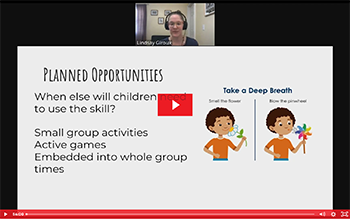
Show Me What to Do: Using Visuals to Teach Social Skills and Emotional Literacy in Early Childhood
In this webinar, you will:
- learn to shift your teaching of social skills and emotional literacy from incidental to intentional instruction
- use easy-to-make visual supports to plan robust instruction of key skills for understanding oneself and others
- practice the steps of planning and note modifications for the children you serve
Presented by:
Lindsay Giroux
Lindsay N. Giroux, M.Ed., specializes in coaching preschool teachers on implementing the Pyramid Model to promote social-emotional development and prevent challenging behavior.
She is the author of Create an Emotion-Rich Classroom: Helping Young Children Build Their Social Emotional Skills and the We Find Feelings Clues picture book series, as well as a contributing author of Connect4Learning®, a Pre-K curriculum and the ChooseFI Pre-K financial literacy curriculum.
Her professional interests include teacher training, social skill instruction, and inclusion of preschoolers with special needs. Lindsay received a B.A. from Wellesley College and an M.Ed. in Early Childhood Special Education from Peabody College of Vanderbilt University.
She is currently the Manager of Educational Quality: Inclusion & Behavior Support for Bright Horizons. She resides in Raleigh, NC with her husband and son.
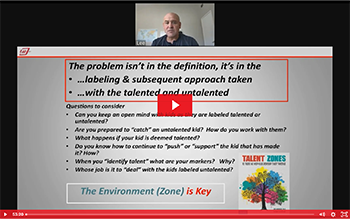
Redefining Talent: Strategies for Equitably Developing Talent in Kids
In this free webinar, you’ll learn how to create learning environments rich in opportunities for all students to boost their confidence and to develop talents in multiple areas.
Presented by:
Dr. Lee Hancock
Dr. Lee Hancock is a professor, performance psychology coach, and program creator who works with students, athletes, coaches, educators, parents, organizations, and other high-level performers.
Dr. Hancock earned his Master’s and Ph.D. from Arizona State University and is a tenured professor in kinesiology at California State University Dominguez Hills. He has had a private practice for more than 20 years, where he has worked with athletes from youth to professional and with classroom teachers, students, and parents of awesome kids.
Dr. Hancock is also an internationally recognized speaker and author. Most importantly, he is a dad of three high-energy, competitive, caring boys. Each time he engages with a person or a group, his goal is always the same: to help them be more prepared to perform their best—when it counts!
He lives in Los Angeles, California.
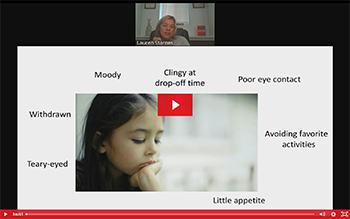
Big Conversations with Young Children: Discussing Questions, Worries, and Fears
This free webinar addresses the big questions children often ask. Presenter Lauren Starnes, Ed.D., will help you prepare to answer difficult questions respectfully and in ways that are developmentally appropriate with even the youngest children.
Presented by:
Lauren Starnes, Ed.D.
Early childhood education expert Dr. Lauren Starnes has completed doctoral studies in both child development and educational leadership.
She currently holds the position of Chief Academic Officer of Goddard Schools, where she is responsible for the development, implementation, and evaluation of the curriculum, educational programming, assessment, and accreditation achievement for the nearly 600 Goddard Schools across the US. Previously, she was the vice president of early childhood education for Primrose School Franchising Company, where she supported curriculum development, implementation, and evaluation. She also served as the company’s executive director of professional development, leading and facilitating instructor-led and eLearning professional development for all stakeholders in the over 420 Primrose Schools. Prior to that she led the early childhood education department for a private education company, authoring their proprietary early childhood curriculum and leading professional development creation and delivery.
Lauren has worked at every level of early childhood education. While she began her formal career teaching at the university level, she has prior experience teaching within preschools, consulting and serving as a support professional for children with autism, and serving as an embedded instructional coach for preschool teachers. She has worked as a school principal for multiple schools and remains actively involved as a voice for early childhood education in various professional associations.
When not working, Lauren enjoys spending time with her family, traveling, and cheering on her two sons in sports. She lives in Marietta, Georgia, near Atlanta.
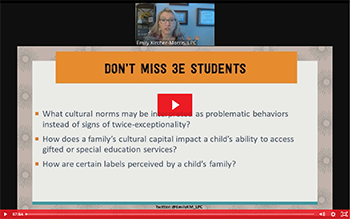
Neurodivergent and Gifted: Supporting Twice-Exceptional Students
Sometimes, twice-exceptional (2e) learners’ giftedness hides their struggles.
Other times, their disability overshadows their giftedness, leaving them without the opportunity for advanced learning.
Teachers who understand how these factors interplay and develop strategies to use strengths-based accommodations give 2e learners the chance to succeed that they deserve.
Presented by:
Emily Kircher-Morris, M.A., M.Ed., LPC
Emily Kircher-Morris, M.A., M.Ed., LPC, inspired by her own experiences as a twice-exceptional (2e) learner, is dedicated to supporting 2e children—including her own—in a way she wasn’t during her academic years.
She has taught in gifted classrooms, has been a school counselor, and is now in private practice as a licensed professional counselor, where she specializes in helping gifted and twice-exceptional kids. Emily is the president and founder of the Gifted Support Network and speaks at statewide and national conferences. She also hosts the Neurodiversity Podcast, which explores parenting, counseling techniques, and best practices for enriching the lives of high-ability people.
Emily lives near St. Louis, Missouri.
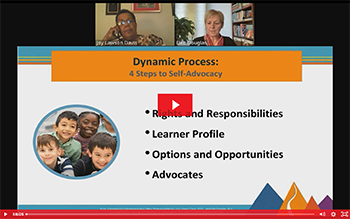
Achieving Equity Through Student Self-Advocacy
This free webinar, based on the research and lived experiences of gifted education experts Joy Lawson Davis, Ed.D., and Deb Douglas, M.S., is designed to help allies better support underrepresented gifted learners as they break through the barriers to self-advocacy and follow their dreams.
Presented by:
Joy Lawson Davis, Ed.D.
Joy Lawson Davis, Ed.D., is a career educator with over 40 years of experience as a practitioner, scholar, author, and consultant with an expertise in equity in gifted education and cultural competency education.
Dr. Davis has served in local, regional, and state leadership positions in gifted education. She also served as an at-large member of the National Association for Gifted Children Board of Directors. A graduate of the College of William & Mary, Dr. Davis holds both master’s and doctorate degrees in gifted education and has led professional learning workshops, appeared on podcasts, and been a long-term program consultant, and served as a keynote speaker and distinguished guest lecturer across the nation, in South Africa, Dubai, Turkey, and the Caribbean.
Dr. Davis has published numerous articles, technical reports, and book chapters related to achieving equity in gifted education. She is also author of two books: the award-winning Bright, Talented & Black: A Guide for Families of African American Gifted Learners and Gifted Children of Color Around the World: Diverse Needs, Exemplary Practices and Directions for the Future, co-edited with Dr. James Moore III. Dr. Davis is currently the Special Populations columnist for Teaching for High Potential and serves on the Gifted Child Today advisory board.
Dr. Davis is co-founder with other equity colleagues of the Jenkins Scholars program, a national program developed to recognize highly gifted Black students.
She lives near Richmond, VA.
Deb Douglas, M.S.
Deb Douglas has spent her professional career as an educator, first as a high school English teacher, then K-12 gifted resource teacher, director of gifted programming, and International Baccalaureate coordinator.
She holds master’s degrees in professional development and curriculum and instruction for gifted learners. She served as president of the Wisconsin Association for Talented and Gifted and member of the National Association for Gifted Children Parent Advisory Board.
As an educational consultant, she continues to advocate for gifted learners, providing self-advocacy workshops for students, professional development for educators, and assistance to parents. She is a frequent presenter and keynoter at regional, state, and national conferences and contributor to Parenting for High Potential. Her original action research on empowering gifted students to self-advocate has been published in The Roeper Review, with new findings presented at conferences of the World Council for Gifted and Talented Children (Sydney, 2017) and the European Council for High Achievement (Dublin, 2018).
Her publications, including her book, The Power of Self Advocacy for Gifted Learners: Teaching the Four Essential Steps to Success (Free Spirit Publishing, 2018), provide parents and educators with the tools needed to encourage and support gifted learners as they create their unique routes to graduation and beyond.
She lives in Madison, Wisconsin.
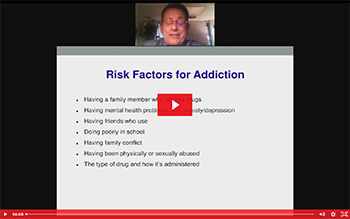
The Big Deal About Addictions: What Educators Need to Know
Since the pandemic, rates of addiction among all age groups have increased.
The stress of online school, not seeing friends, and increased isolation make it harder for many kids (and parents) to cope. In addition to causing anxiety and depression, the pandemic has also led to an increase in addictions. These can take many forms, from substance addictions such as to marijuana and alcohol, to behavioral addictions such as to video games, social media, texting, and more.
As a result, many kids and teens are struggling to keep up with online schooling.
Presented by:
James J. Christ, Ph.D., C.S.A.C.
He has authored and coauthored numerous books including I'm Here: A Peer Counseling Guide for Teens; What's the Big Deal About Addictions?; What to Do When You're Cranky and Blue; What to Do When You're Scared and Worried; Siblings: You're Stuck with Each Other, So Stick Together; and The Survival Guide to Making and Being Friends.
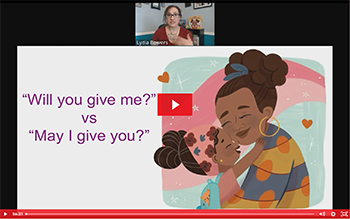
Consent Is a Social-Emotional Skill: Building a Culture of Consent in Your School
When we create a culture of consent, we provide a safe space for children and empower them to set and respect boundaries.
In this free webinar, you’ll learn:
- how to support children’s understanding of empathy and consent
- considerations for modeling and teaching consent in a classroom setting
- consent vocabulary and activities to use with young children
- how consent fits into an SEL framework
Presented by:
Lydia Bowers
Lydia Bowers is a speaker, consultant, and trainer who happily exists in the Venn diagram overlap between early childhood and sex education.
After spending almost two decades working directly with children as a classroom teacher and a parent, she is passionate about reframing sexuality conversations. Lydia now teaches families and educators how to talk to children about subjects like gender, reproduction, and abuse. When she’s not traveling around the country for conferences and speaking engagements, she lives in Cincinnati with her husband and two children and adds to her growing collection of children’s book character tattoos as often as she can.
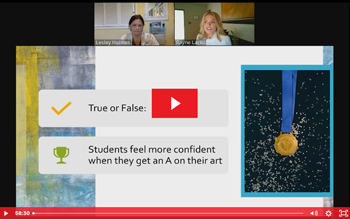
Creative Ways to Help Students Manage Their Emotions
Integrating creative projects into your classroom curriculum is a great way to help students gain awareness of their emotions, discover safe ways to express difficult feelings, and make proactive choices toward setting and meeting goals.
Presented by:
Rayne Lacko
Rayne Lacko is a Young Adult author and an advocate for the arts as a form of social and emotional well-being.
A teen-writing mentor, she cohosts a youth creative workshop, an annual writing camp, and a teen arts showcase. Through her work, she inspires young people and their families to use creativity to stimulate positive change in their lives and communities.
Rayne lives near Seattle, Washington, with her spouse and two boys (a pianist and a drummer), a noisy cat, and her canine best friend.
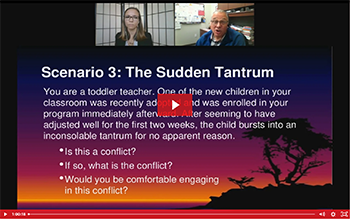
Finding Your Way Through Conflict: Getting Started
In this edWebinar, presenters Chris Amirault and Christine M. Snyder introduce you to the basics of finding your way through conflict. Using engaging, real-life scenarios to support your self-reflection and understanding, we discuss the critical principles and attitudes required for successful conflict engagement.
Presented by:
Chris Amirault, Ph.D.
Chris Amirault, Ph.D., is the school director of Tulsa Educare MacArthur in Oklahoma, and for more than three decades has dedicated himself to high-quality education, teaching courses and facilitating workshops on early childhood education, conflict, assessment and instruction, ethics and professionalism, challenging behavior, family engagement, anti-bias education, and equity.
Prior to his arrival in Tulsa, he lived in Mexico, working as a consultant focusing on organizational culture, change management, and QRIS system design in Oregon, Rhode Island, and California. For thirteen years prior to that, he served as executive director of the Brown/Fox Point Early Childhood Education Center affiliated with Brown University in Rhode Island. During that time, he also taught early childhood education and development courses for area colleges and universities and served as a mentor and coach for providers throughout the community.
Chris also has an active volunteer life at the local, state, and national level. He served as the president of the Rhode Island Association for the Education of Young Children for several years, served as the chair of the Council for NAEYC Accreditation, and was a founding facilitator of NAEYC’s Diversity & Equity Interest Forum.
He lives in Tulsa, Oklahoma.
Christine Snyder, M.A.
Christine M. Snyder, M.A., has worked in the early childhood education field since 1999 as a teacher, center director, author, and trainer/coach. She holds a master’s degree in early childhood education and a bachelor’s degree in child development.
She is currently director of the University of Michigan Health System Children’s Center and assistant professor in the college of education at Madonna University in Livonia, Michigan. Previously, she was an early childhood specialist at the HighScope Educational Research Foundation in Ypsilanti, Michigan, where she focused on developing professional learning for teachers and curriculum for preschoolers and infants/toddlers.
She facilitates training throughout the United States, internationally, and online, and has published several books, articles, training DVDs, and other classroom resources for teachers.
She lives in Michigan.

Ready, Set, Grow - How to Teach Growth Mindset in Grades K-8
Drawing on insight from years of teaching growth mindset in the classroom, presenter Shannon Anderson, M.Ed., shares positive, practical, you-can-do-it advice on building an improved mindset and accomplishing goals—for kids of all abilities. Everyone faces obstacles, and it’s easy to get stuck in a fixed mindset or give up when we encounter them. In this edWebinar, learn how to change the way your students think about their challenges so that instead of giving up, they can grow, feel better about themselves, and get better at the things they try.
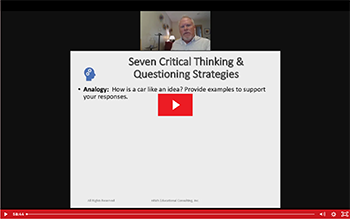
Help Students Develop Critical Thinking Online and in the Classroom
Critical thinking is an essential tool in today’s highly complex and confusing world.
In this webinar, you will learn:
- how to construct challenges that develop critical thinking, especially in an online platform
- how to help your students develop effective conscious thinking that is organized, fair-minded, well-reasoned, and clearly communicated
- how virtual learning can enhance deeper learning
Presented by:
Dr. Richard M. Cash
Dr. Richard M. Cash is an award-winning author and educator who has worked in the field of education for over thirty years.
His range of experience includes teaching, curriculum coordination, and program administration. Currently, he is an internationally recognized education consultant (www.nrichconsulting.com). His consulting work has taken him throughout the United States, as well as into Canada, the Czech Republic, China, England, Indonesia, the Kingdom of Saudi Arabia, Mexico, Oman, Poland, Qatar, Spain, South Korea, and Turkey.
Richard received his doctorate in educational leadership and a master’s degree in curriculum and instruction from the University of St. Thomas in Minneapolis, Minnesota. Along with his bachelor’s degree in education from the University of Minnesota, Richard holds a bachelor’s degree in theater from the University of Wisconsin, Eau Claire.
For over ten years, he co-directed a children’s theater company in Minnesota, and coauthored four award-winning children’s plays. He was recipient of the National Association for Gifted Children’s Early Leader Award (2011), recognizing his leadership in programming for gifted children. Richard was also named the “Friend of the Gifted, 2016” by Minnesota Educators of the Gifted and Talented.
His areas of expertise are educational programming, rigorous and challenging curriculum design, differentiated instruction, 21st century skills, brain-compatible classrooms, gifted and talented education, and self-regulated learning. Dr. Cash is the author of Advancing Differentiation: Thinking and Learning for the 21st Century (2011/2017), Self-Regulation in the Classroom: Helping Students Learn How to Learn (2016), and coauthor of (with Diane Heacox) Differentiation for Gifted Learners: Going Beyond the Basics (2014/2020), a finalist for the Association for Educational Publishers Distinguished Achievement Award, and winner of The Legacy Book® Award for Outstanding Educators Publication.
Richard lives in Minneapolis, Minnesota, and Palm Springs, California.
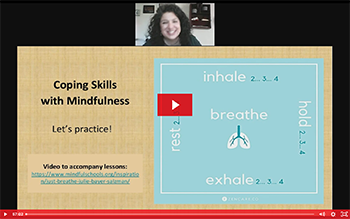
How Educators Can Respond to Students Experiencing Trauma
In this edWebinar, school counselor Stephanie Filio, M.Ed., author of Responding to Student Trauma, gives an overview of how students experience trauma at four levels: self/home, school, community, and country/world.
Presented by:
Stephanie Filio, M.Ed.
Stephanie Filio, M.Ed., is a middle school counselor in Virginia Beach, Virginia.
She received her undergraduate degree in interdisciplinary studies from the University of Virginia and her M.Ed. in counseling from Old Dominion University. In a discussion with one of her UVA professors about her desire to stay in school forever, her mentor wisely responded, “If you want to be a lifelong learner, go into education,” and so she found her place. Prior to school counseling, Stephanie worked in private education, specializing in standardized tests, test preparation, and future planning.
She writes about her career and hobbies at her blog, Weekend Therapy, and can be found on Twitter @steffschoolcoun.
Stephanie also enjoys spending time with her books, crafts, and family.
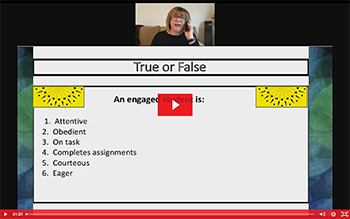
Inspiring Student Empowerment: Moving Beyond Engagement, Refining Differentiation
In this webinar, veteran educator Patti Drapeau shares practical, evidence-based practices that shift focus from engaging students to empowering them, and from differentiation to personalized learning.
You’ll learn how school districts that have focused on student empowerment have seen a rise in test scores, motivation, attention, and self-confidence.
Presented by:
Patti Drapeau
Patti Drapeau (pattidrapeau.com) is an internationally active educational consultant, author, and presenter, with more than twenty-five years of classroom experience.
Patti conducts keynote sessions as well as short- and long-term workshops in the United States and abroad. She commonly presents on the following topics: differentiation, creativity, engagement, gifted education, student empowerment, and personalized learning. Patti is the founder of Patti Drapeau Educational Consulting Services and has received the New England Region Gifted and Talented award for outstanding contributions in gifted education and the Maine Educators of the Gifted and Talented award for exemplary service.
Patti coached programs such as Odyssey of the Mind, Future Problem Solving, Explorer Vision, and math teams. She also developed a curriculum model for the regular classroom called “Affective Perspectives: Combining Critical Thinking, Creative Thinking, and Affect,” and authored a variety of articles for the Maine Exchange, Teaching Matters, and Understanding our Gifted. Her other books include Sparking Student Creativity: Practical Ways to Promote Innovative Thinking and Problem Solving, Differentiating with Graphic Organizers: Tools to Foster Critical and Creative Thinking, Differentiated Instruction: Making It Work, and Great Teaching with Graphic Organizers. Patti currently works as a consultant and she is a part-time faculty member at the University of Southern Maine.
She lives in Freeport, Maine.
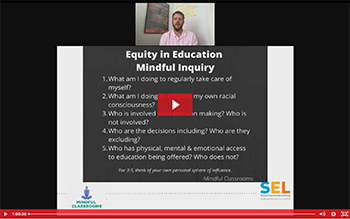
How Mindfulness Fits into Education in the Pandemic Era
In this webinar, participants will:
- learn strategies for incorporating mindfulness into a daily self-care routine
- explore mindful inquiry in their efforts to make sure all students have equitable access to education
- engage with simple mindfulness practices that can be woven into synchronous and asynchronous learning opportunities for students
- explore how mindfulness fits into education during the coronavirus pandemic
- grow their general understanding of mindfulness in education
Presented by:
James Butler, M.Ed.
James Butler, M.Ed., has been teaching kindergarten and prekindergarten since 2002. He has a B.S. in education and early childhood from Indiana’s Manchester University and an M.Ed. in curriculum and instruction from Grand Canyon University.
He is now the SEL (social-emotional learning) mindfulness specialist for the Austin Independent School District (AISD), working with teachers, staff, administrators, parents, and grades preK–12 students. During the 2016–2017 school year, James helped implement a mindfulness curriculum in all 130 AISD campuses.
He lives in Austin, Texas.
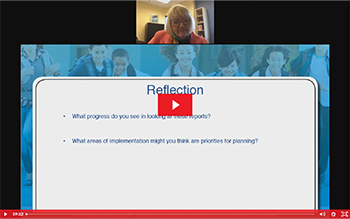
Advances in PBIS: Contributions for Creating Equitable Systems
In this webinar, Char Ryan, Ph.D., describes the current recommended practice for data usage in PBIS and highlights the newer data tools.
She also explains systemwide policies and practices that enhance the ability of a school or district to implement equitable instruction and discipline.
Presented by:
Char Ryan, Ph.D.
Char Ryan, Ph.D., is a PBIS coach and evaluation specialist. She has been a Minnesota state SWIS and PBIS trainer working with school teams.
Char was formerly the Minnesota state PBIS coordinator and PBIS coach for a regional PBIS project. She was an assistant professor at St. Cloud State University and an adjunct professor in teacher training at the University of St. Thomas.
Char works and lives in Minneapolis, Minnesota.
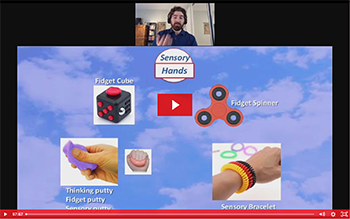
Engagement Strategies for Students with Attention Challenges: Lower Anxiety and Raise Confidence
In this webinar, Ezra Werb, M.Ed., formerly a behavior interventionist and resource specialist teacher and currently an educational therapist, shares his strategies for lowering students’ anxiety, raising confidence, and increasing engagement.
Presented by:
Ezra Werb, M.Ed.
Ezra Werb, M.Ed., formerly a behavior interventionist and resource specialist teacher and currently an educational therapist, has been working with students with attention deficits, learning challenges, and spectrum disorders in typical classroom settings, resource rooms, and one-on-one academic support scenarios for more than a dozen years.
Ezra earned his master’s in special education with a concentration in educational therapy from Cal-State Northridge and is a member of the Association of Educational Therapists.
He lives in Boston, Massachusetts, where he works in private practice with students with ADHD, spectrum disorders, dyslexia, anxiety, and other learning challenges.
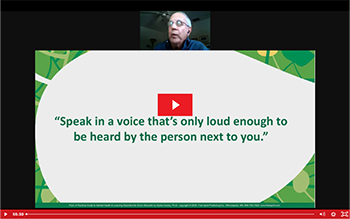
Understanding and Supporting Students with Mental Health and Learning Disorders
In this edWebinar, clinical psychologist Dr. Myles Cooley provides guidelines on supporting these students and communicating with them and their parents.
Presented by:
Dr. Myles Cooley
Myles L. Cooley, Ph.D., has been practicing psychology for over thirty years. He evaluates and treats children, adolescents, and adults for a variety of problems.
Dr. Cooley serves as a consultant to schools and has presented educational programs to educators, mental health professionals, physicians, and parents.
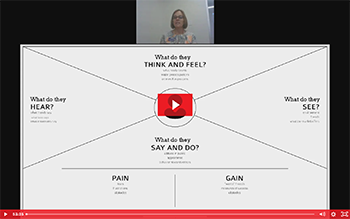
How to Fill the World with Leaders: Creating School Cultures Where Student Leadership Thrives
Join award-winning student leadership specialist Mariam MacGregor to evaluate the current state of leadership development efforts in your school as you strive to prepare students for lifelong leadership regardless of career path.
In this webinar, attendees will learn how to:
- initiate a broad inventory of existing leadership efforts
- find opportunities to implement culture change
- identify and overcome roadblocks to student leadership development
- create a leadership communication plan
Presented by:
Mariam MacGregor
Mariam G. MacGregor, M.S., is assistant vice chancellor for Employee Engagement and Success at TCU and a nationally recognized leadership consultant who works with schools (K–12 and higher education), nonprofit agencies, faith groups, and communities interested in developing meaningful, sustainable leadership efforts for kids, teens, and young adults.
Mariam lived in Colorado for many years, where she served as the school counselor and coordinator of leadership programs at an alternative high school and received an honorable mention for Counselor of the Year. She also worked with college student leaders at Syracuse University, Santa Clara University, Metropolitan State College of Denver, and Texas Christian University (TCU), and was the youth volunteer trainer for Night Lights (a respite care program that serves families of kids with special needs) and EPIC Mentors (a program started by one of her sons at his elementary school that pairs peer mentors with kids with learning challenges).
She currently lives in Texas.
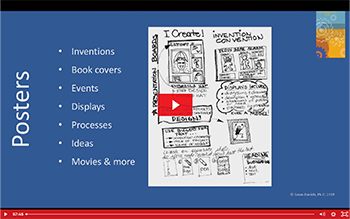
Developing a Visual Learning and Teaching Toolbox
In this webinar, Dr. Susan Daniels, author of Visual Learning and Teaching, explores creative and practical strategies that enable educators to work with the foundational skills of visual learning in the classroom. Attendees build a “visual toolbox” for use in visual learning and teaching.
Presented by:
Dr. Susan Daniels
Dr. Susan Daniels is a professor, author, consultant, and educational director of a psychoeducational center that specializes in the needs of gifted, creative, and twice-exceptional children.
She has been a professional development specialist for over twenty years, regularly providing workshops and training on creativity and visual learning and teaching. Susan is an avid doodler who enjoys working visually in her journals, and she is dedicated to supporting teachers’ development of visual literacy and enhanced understanding of visual learning and teaching strategies.
She lives in Berkeley, California.
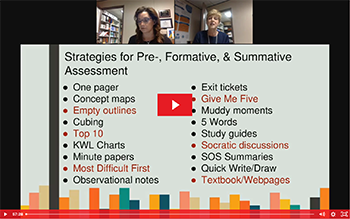
Flexible Grouping and Collaborative Learning: Making It Work
In this webinar, Dina Brulles, Ph.D., and Karen Brown, M.Ed., share practical strategies to successfully implement flexible grouping in order to build student collaboration and respond to students’ diverse learning needs and abilities.
You will learn:
- how to plan for flexible grouping
- strategies to use within the groups
- how to keep structures fluid and manageable
- when and how student work within groupings should be evaluated
- and more
Presented by:
Dina Brulles, Ph.D.
Dina Brulles, Ph.D., is the gifted program coordinator at Arizona State University and the former director of gifted education at Paradise Valley Unified School District in Arizona. She recently served as NAGC’s Governance Secretary and also as the board’s school district representative.
Dina received the prestigious 2022 NAGC Ann F. Isaacs Founder’s Memorial Award. She was also the recipient of the 2019 and the 2020 NAGC Book of the Year Award (for practitioners), NAGC’s inaugural 2014 Gifted Coordinator Award, and the Professional Development Network Award in 2013.
Dina has actively supported and served as a mentor for the Javits Frasier Scholarship Program since 2010. Dr. Brulles’ work emphasizes and encourages equitable and inclusive identification practices and programming in gifted education. By sharing her interests and experiences, Dr. Brulles supports others in their efforts to develop all our gifted learners’ potential.
Karen L. Brown, M.Ed.
Karen L. Brown, M.Ed., is an education consultant and a gifted program mentor at Paradise Valley Unified School District in Arizona. She was previously an elementary school gifted specialist and a professor of gifted education at Arizona State University.
Karen lives in Phoenix, Arizona.
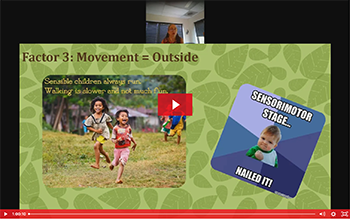
What You Can Do Today to Lessen Challenging Behaviors Tomorrow
At times, teachers feel powerless in the face of challenging behaviors by children. Early childhood professionals can take steps toward lessening these behaviors and increasing joy and engagement in the classroom.
In this webinar, Michelle Salcedo, M.Ed., chief academic officer at Sunshine House Early Learning Academy, speaker, and author, provides five concrete strategies teachers can implement immediately to make their classrooms more peaceful and more fun for all.
Presented by:
Michelle Salcedo, M.Ed.
Michelle Salcedo, M.Ed., has worked in the field of early childhood for over thirty years, starting as a teacher’s helper in her younger brother’s center.
She has served as a teacher, director, trainer, and family educator in numerous childcare settings across Michigan, South Carolina, and Spain. Michelle has led the education initiatives of two of the largest childcare firms in the United States.
Her articles on young children frequently appear in various electronic and print publications and she has traveled the country speaking at local, state, and national conferences.
Currently, she is a content developer for a national early childhood training company. Michelle lives in Greenville, South Carolina.
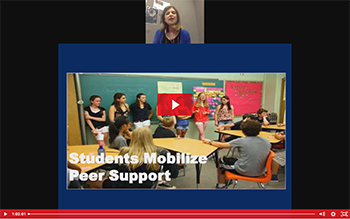
End Peer Cruelty, Build Empathy: Create Safe, Caring, Inclusive Learning Climates
Bullying, alienation, and self-doubt should not—and need not—plague any students in our classrooms.
In this edWebinar, a sought-after educational consultant offers proven, practical teaching practices that mobilize student empathy.
Dr. Michele Borba shares proactive, no-cost strategies you can use the very next day in your classroom and can weave into existing lesson plans.
Presented by:
Dr. Michele Borba
Michele Borba, Ed.D., is a globally recognized educational psychologist and an expert in character development and bullying prevention whose aim is to strengthen children’s empathy and resilience and break the cycle of youth violence.
She has delivered keynotes and workshops to over 1 million participants and authored 24 books translated into 14 languages. Dr. Borba is an NBC contributor with frequent appearances on the Today show as well as Dateline, Anderson Cooper, Dr. Phil, Dr. Oz, The View, NBC Nightly News, CNN, and others.
She is an in-demand motivational speaker and former classroom teacher.
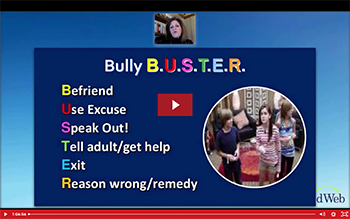
Cultivating Empathy: The Best Antidote to Bullying
In this webinar, Dr. Michele Borba shares evidence that the best way to reduce bullying is not with a packaged program but with homegrown, data-driven efforts by a staff that applies only proven practices. Best yet, none of these strategies cost a dime!
Presented by:
Dr. Michele Borba
Michele Borba, Ed.D., is a globally recognized educational psychologist and an expert in character development and bullying prevention whose aim is to strengthen children’s empathy and resilience and break the cycle of youth violence.
She has delivered keynotes and workshops to over 1 million participants and authored 24 books translated into 14 languages. Dr. Borba is an NBC contributor with frequent appearances on the Today show as well as Dateline, Anderson Cooper, Dr. Phil, Dr. Oz, The View, NBC Nightly News, CNN, and others.
She is an in-demand motivational speaker and former classroom teacher.
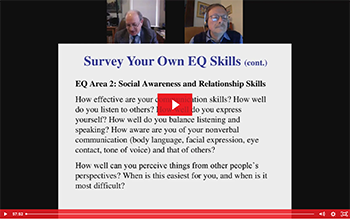
How to Boost Emotional Intelligence in Students
In this edWebinar, Maurice J. Elias, Ph.D., and Steven E. Tobias, Psy.D., coauthors of Boost Emotional Intelligence in Students: 30 Flexible Research-Based Activities to Build EQ Skills (Grades 5–9), talk about what emotional intelligence is and why and how you can build valuable EQ skills in your students.
Presented by:
Maurice J. Elias, Ph.D.
Maurice J. Elias, Ph.D., is a professor and former director of clinical training in the Department of Psychology, Rutgers University. He is also director of the Rutgers Social-Emotional and Character Development Lab (www.secdlab.org), academic director of the Collaborative Center for Community-Based Research and Service (engage.rutgers.edu), and founding member of the Leadership Team for the Collaborative for Academic, Social, and Emotional Learning (CASEL).
Dr. Elias lectures nationally and internationally and devotes his research and writing to the area of social-emotional and character development in children, schools, and families. He is a licensed psychologist and writes a blog on social-emotional and character development for the George Lucas Educational Foundation at www.edutopia.org.
He lives in New Jersey with his wife, Ellen, near their children and grandchildren.
Steven E. Tobias, Psy.D.
Steven E. Tobias, Psy.D., is the director of the Center for Child & Family Development in Morristown, New Jersey.
He has over thirty years of experience working with children, parents, families, and schools. Dr. Tobias feels a strong commitment to children’s social and emotional development and provides consultation to schools as a way of reaching many children, including those who are underserved in terms of their social and emotional needs.
He has co-authored several books with Dr. Maurice Elias, including Emotionally Intelligent Parenting and Raising Emotionally Intelligent Teenagers. He has given lectures throughout the United States on topics related to parenting and children’s emotional development.
Dr. Tobias lives in New Jersey.
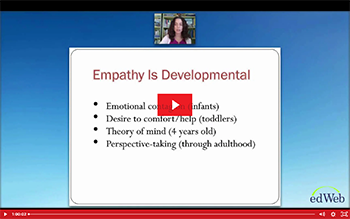
Everyday Strategies to Build a Sustainable Culture of Kindness
In this edWebinar, Christa M. Tinari, M.A., educational consultant and coauthor of Create a Culture of Kindness in Middle School, explores the everyday reasons why kindness efforts might fail.
Presented by:
Christa M. Tinari, M.A.
Christa M. Tinari, M.A., is a nationally recognized speaker, trainer, and peacebuilder. She provides educational consulting on bullying prevention, social-emotional learning, and school climate improvement, to schools and organizations across the country.
Christa is creator of The Feel & Deal Activity Deck, an empathy-building tool for children used on six continents. She frequently presents at conferences such as AMLE, ASCD, and the International Bullying Prevention Association. Christa passionately believes in the power of education to inspire hearts and expand minds.
She lives in Pennsylvania.
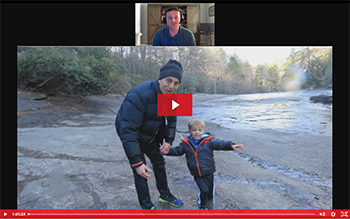
Catching Happiness: How to Work Through Burnout and Be a Joy-Filled Teacher
In this webinar, award-winning teacher, motivational speaker, and author Justin Ashley addresses the whole teacher: You and your bank account. Your health. Your social network. How can you be a better teacher . . . and a better parent, spouse, and friend.
Presented by:
Justin Ashley
Justin Ashley is an award-winning teacher, motivational speaker, author, and public education advocate from Charlotte, North Carolina, where he began teaching in 2007.
He is also a highly sought-after speaker for professional development. He has been an inspirational keynote presenter for thousands of current and future teachers, creating an atmosphere that bounces back and forth between rapt silence and raucous laughter.
In 2013, he became the only teacher ever to win both North Carolina History Teacher of the Year and North Carolina Social Studies Teacher of the Year in the same year.
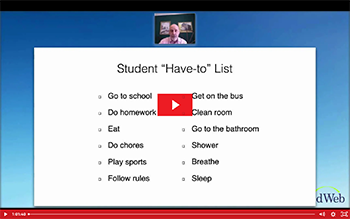
Emotional Intelligence in ELA and Social Studies: Integrating Social-Emotional Learning into the Curriculum in Ways that Satisfy State Standards
In this webinar, Jonathan Erwin, M.A., provides a research-based rationale for teaching SEL, shares lessons that teach specific SEL skills, and shows how you can use SEL content to satisfy state standards.
Leverage Erwin’s 30-plus years in education to learn how SEL can be an excellent vehicle for satisfying the requirements of your state’s ELA standards in addition to improving students’ attitudes and behaviors.
This webinar will benefit ELA and social studies teachers of third through twelfth grades, counselors, social workers, and youth empowerment leaders.
Presented by:
Jonathan Erwin, M.A.
Jonathan C. Erwin, M.A., has been a secondary English teacher, professional development specialist, college professor, and director of training and curriculum for a federally funded character education program.
His previous books include The Classroom of Choice (ASCD, 2004) and Inspiring the Best in Students (ASCD, 2010). Jon is currently an independent educational consultant, a senior faculty member of the William Glasser Institute, and a trained HealthRhythms Facilitator.
Jon’s work focuses on providing research-based approaches to teaching, managing, counseling, and training that appeal to intrinsic motivation and help children, adolescents, and adults develop physically, intellectually, emotionally, and socially.
A musician and martial arts enthusiast, Jon has earned a second degree black belt in karate and a first degree black belt in Tae Kwon Do. He lives in western New York.
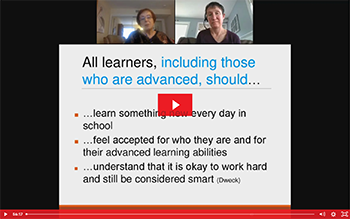
Recognizing and Successfully Teaching Twice-Exceptional Students
In this webinar, Susan Winebrenner, M.S., and Lisa M. Kiss, M.Ed., describe how to identify twice-exceptional (2e) students—students who are gifted and have another learning difference—and how to meet their academic and social-emotional needs in any classroom.
Presented by:
Susan Winebrenner, M.S.
Susan Winebrenner, M.S., is a full-time consultant in staff development.
She presents workshops and seminars nationally and internationally, helping educators translate educational research into classroom practice.
Lisa Kiss, M.Ed.
Lisa M. Kiss, M.Ed., is the director of special education at Tulpehocken School District in Berks County, Pennsylvania.
Previously, she taught in special education and gifted education for over twenty years. She has supervised numerous student teachers and has presented at several state conferences on the topics of cluster grouping and inclusion to help all students be successful.
She lives in Lebanon, Pennsylvania.
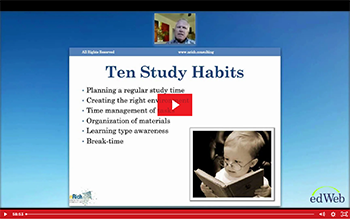
Self-Regulation in the Classroom: Helping Students Learn How to Learn
In this webinar, Dr. Richard Cash discusses doable, evidence-based practices to help students engage in learning, build confidence, set and manage goals, develop habits of thinking, do effective home study, and reflect on their learning. Dr. Cash will share real stories of students who achieved success through SRL skills.
Presented by:
Dr. Richard M. Cash
Dr. Richard M. Cash is an award-winning author and educator who has worked in the field of education for over thirty years.
His range of experience includes teaching, curriculum coordination, and program administration. Currently, he is an internationally recognized education consultant (www.nrichconsulting.com). His consulting work has taken him throughout the United States, as well as into Canada, the Czech Republic, China, England, Indonesia, the Kingdom of Saudi Arabia, Mexico, Oman, Poland, Qatar, Spain, South Korea, and Turkey.
Richard received his doctorate in educational leadership and a master’s degree in curriculum and instruction from the University of St. Thomas in Minneapolis, Minnesota. Along with his bachelor’s degree in education from the University of Minnesota, Richard holds a bachelor’s degree in theater from the University of Wisconsin, Eau Claire.
For over ten years, he co-directed a children’s theater company in Minnesota, and coauthored four award-winning children’s plays. He was recipient of the National Association for Gifted Children’s Early Leader Award (2011), recognizing his leadership in programming for gifted children. Richard was also named the “Friend of the Gifted, 2016” by Minnesota Educators of the Gifted and Talented.
His areas of expertise are educational programming, rigorous and challenging curriculum design, differentiated instruction, 21st century skills, brain-compatible classrooms, gifted and talented education, and self-regulated learning. Dr. Cash is the author of Advancing Differentiation: Thinking and Learning for the 21st Century (2011/2017), Self-Regulation in the Classroom: Helping Students Learn How to Learn (2016), and coauthor of (with Diane Heacox) Differentiation for Gifted Learners: Going Beyond the Basics (2014/2020), a finalist for the Association for Educational Publishers Distinguished Achievement Award, and winner of The Legacy Book® Award for Outstanding Educators Publication.
Richard lives in Minneapolis, Minnesota, and Palm Springs, California.
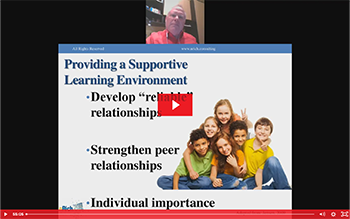
Fostering Confidence to Engage Students in Learning
In this webinar, Richard M. Cash, Ed.D., discusses specific strategies to build and shape students’ confidence and make your classroom an enjoyable learning environment for all.
Presented by:
Dr. Richard M. Cash
Dr. Richard M. Cash is an award-winning author and educator who has worked in the field of education for over thirty years.
His range of experience includes teaching, curriculum coordination, and program administration. Currently, he is an internationally recognized education consultant (www.nrichconsulting.com). His consulting work has taken him throughout the United States, as well as into Canada, the Czech Republic, China, England, Indonesia, the Kingdom of Saudi Arabia, Mexico, Oman, Poland, Qatar, Spain, South Korea, and Turkey.
Richard received his doctorate in educational leadership and a master’s degree in curriculum and instruction from the University of St. Thomas in Minneapolis, Minnesota. Along with his bachelor’s degree in education from the University of Minnesota, Richard holds a bachelor’s degree in theater from the University of Wisconsin, Eau Claire.
For over ten years, he co-directed a children’s theater company in Minnesota, and coauthored four award-winning children’s plays. He was recipient of the National Association for Gifted Children’s Early Leader Award (2011), recognizing his leadership in programming for gifted children. Richard was also named the “Friend of the Gifted, 2016” by Minnesota Educators of the Gifted and Talented.
His areas of expertise are educational programming, rigorous and challenging curriculum design, differentiated instruction, 21st century skills, brain-compatible classrooms, gifted and talented education, and self-regulated learning. Dr. Cash is the author of Advancing Differentiation: Thinking and Learning for the 21st Century (2011/2017), Self-Regulation in the Classroom: Helping Students Learn How to Learn (2016), and coauthor of (with Diane Heacox) Differentiation for Gifted Learners: Going Beyond the Basics (2014/2020), a finalist for the Association for Educational Publishers Distinguished Achievement Award, and winner of The Legacy Book® Award for Outstanding Educators Publication.
Richard lives in Minneapolis, Minnesota, and Palm Springs, California.
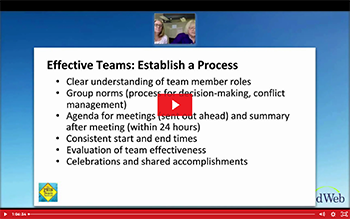
Positive Behavior Interventions and Supports (PBIS): School-Wide Leadership and Implementation
In this edWebinar, the authors of The PBIS Team Handbook: Setting Expectations and Building Positive Behavior—Char Ryan, Ph.D., a former statewide trainer, and Beth Baker, M.S.Ed., a school- and district-wide coach—lead you through the decision to implement PBIS in your school or district.
Presented by:
Char Ryan, Ph.D.
Char Ryan, Ph.D., is a PBIS coach and evaluation specialist. She has been a Minnesota state SWIS and PBIS trainer working with school teams.
Char was formerly the Minnesota state PBIS coordinator and PBIS coach for a regional PBIS project. She was an assistant professor at St. Cloud State University and an adjunct professor in teacher training at the University of St. Thomas.
Char works and lives in Minneapolis, Minnesota.
Beth Baker, M.S.Ed.
Beth Baker, M.S.Ed., is a teacher and advocate for students with special needs.
During her twenty-plus years in education, Beth has taught in self-contained special education classrooms, implemented and coached PBIS teams, and worked as a behavior specialist. She was also a district program facilitator assisting staff with professional development around social-emotional learning and coaching them in supporting students with emotional-behavioral needs.
Recently she has been teaching abroad and implementing PBIS at international schools. Beth loves creating positive paths to behavior change, whenever and wherever she can. She presents frequently on social-emotional learning and PBIS, both in the US and internationally.
She lives in Minneapolis, Minnesota. Watch a free webinar with Beth Baker, M.S.Ed., and Char Ryan, Ph.D.: Positive Behavior Interventions and Supports (PBIS): School-Wide Leadership and Implementation.
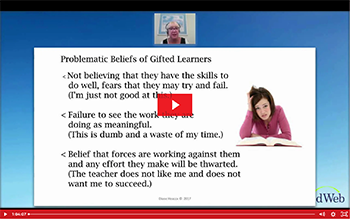
Motivating the Gifted but Reluctant Learner
In this webinar, Dr. Diane Heacox explores well-documented research on underlying causes of low performance and creates distinctions between non-producers, selective producers, and underachievers among the gifted populations. Teachers often struggle to reach students who actively or passively resist engagement in learning. This session identifies behaviors that distinguish students who are having motivational issues.
Presented by:
Dr. Diane Heacox
Diane Heacox, Ed.D., is a consultant and professional development trainer focusing on strategies to increase learning success for all students. She is professor emerita at St. Catherine University in St. Paul, Minnesota. She is a national and international consultant and professional development trainer to both public and private schools on a variety of topics related to teaching and learning.
Dr. Heacox has taught at both elementary and secondary school levels and has served as a gifted education teacher and administrator, as well as an instructional specialist in public education. Dr. Heacox is also the author of four books. Her first book for Free Spirit Publishers was Up From Underachievement: How Teachers, Students, and Parents Can Work Together. Her second book, Differentiating Instruction in the Regular Classroom: How to Reach and Teach All Learners was updated and re-released in 2012. Making Differentiation a Habit earned the 2010 Association of Education Publishers Distinguished Achievement Award and was updated in 2017.
Her book coauthored with Richard Cash, Differentiation for Gifted Learners: Going Beyond the Basics, received the 2014 Legacy Book Award for Educators by the Texas Association for Gifted and Talented. Dr. Heacox’s books have been translated into Dutch, Hungarian, Korean, Arabic, and Portuguese.
Her Differentiation Classroom Practices Inventory was used by the Ministry of Education in Portugal for conducting a national survey of classroom practices. Dr. Heacox serves on the Board of Directors of the Minnesota Association of Supervision and Curriculum Development (MN ASCD) and the Minnesota Department of Education Gifted Education Advisory Board.
She is the past chair for the Middle Level Network and the Education committee for National Association for Gifted Children and the current facilitator of the Higher Education Division for international ASCD.
Dr. Heacox was recognized by the Minnesota Educators of Gifted and Talented as a Friend of the Gifted for service to gifted education. She is also in the University of St. Thomas Educators Hall of Fame for contributions to the field of education.
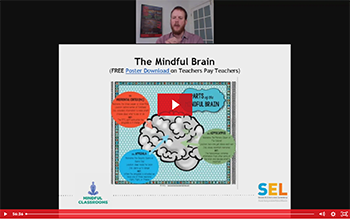
Making Mindfulness Work in Your School
In this webinar, James Butler, M.Ed., a former early childhood educator and current mindfulness specialist, focuses on making mindfulness work in your school.
Learn about the connection between mindfulness and self-care, the basics of what mindfulness is and isn’t, the importance of focusing on the adult first, ideas for student and staff buy-in, and simple strategies for using mindfulness in the classroom and in a schoolwide community.
James, an educator for 16 years, shares his personal experience of using mindfulness to help him deal with the stresses of life and education, how he successfully implemented mindfulness practices with students from as young as four to high school seniors, and how he helped an urban school district with 130 schools embrace mindfulness as a means to support social-emotional learning and growth for adults and students alike.
Presented by:
James Butler, M.Ed.
James Butler, M.Ed., has been teaching kindergarten and prekindergarten since 2002. He has a B.S. in education and early childhood from Indiana’s Manchester University and an M.Ed. in curriculum and instruction from Grand Canyon University.
He is now the SEL (social-emotional learning) mindfulness specialist for the Austin Independent School District (AISD), working with teachers, staff, administrators, parents, and grades preK–12 students. During the 2016–2017 school year, James helped implement a mindfulness curriculum in all 130 AISD campuses.
He lives in Austin, Texas.
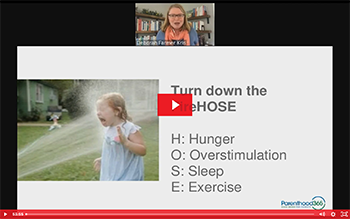
Helping Children Develop Emotional Literacy - You Have Feelings All the Time
You likely don’t need the leading pediatric organizations to officially declare the mental health crisis among kids a national emergency (but they have)—you are in the classroom with children every day. Concrete support from caring adults helps kids when they become overwhelmed by their own strong, uncomfortable feelings.
While all human emotions can be normal and healthy, students who build emotional literacy skills are better equipped to learn in school, to deal with daily challenges, and to form healthy relationships with peers.
In this webinar, you'll learn more about the science of emotion and how educators can develop classroom routines and strategies that help kids name, normalize, and navigate big feelings.
Presented by:
Deborah Farmer Kris
Deborah Farmer Kris is a child development expert and parent educator. She serves as a columnist and consultant for PBS KIDS, and she writes for NPR's MindShift and other national publications.
Over the course of her career, Deborah has taught almost every grade K-12, served as a school administrator, directed leadership institutes, and presented to hundreds of parents and educators around the United States.
Deborah and her husband live in Massachusetts with their two kids, who love to test every theory she’s ever had about child development. Mostly, she loves sharing nuggets of practical wisdom that can help kids and families thrive.